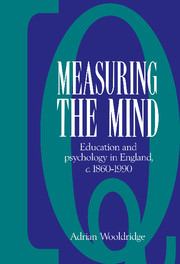Book contents
- Frontmatter
- Contents
- Acknowledgements
- List of abbreviations
- 1 Introduction
- 2 Studying childhood
- 3 The invention of educational psychology
- 4 Cyril Burt and the psychology of individual differences
- 5 Susan Isaacs and the psychology of child development
- 6 The structure and status of a profession
- 7 Mental measurement and the meritocratic ideal
- 8 The psychometric perspective
- 9 Psychologists as policy makers, 1924–1944
- 10 The measurement of merit anatomised
- 11 Equality and community versus merit
- 12 Egalitarianism triumphant
- 13 Cyril Burt and the politics of an academic reputation
- 14 Equality and human nature
- 15 The measurement of merit revived?
- 16 Conclusion
- Glossary
- Selective bibliography
- Index
7 - Mental measurement and the meritocratic ideal
Published online by Cambridge University Press: 11 March 2010
- Frontmatter
- Contents
- Acknowledgements
- List of abbreviations
- 1 Introduction
- 2 Studying childhood
- 3 The invention of educational psychology
- 4 Cyril Burt and the psychology of individual differences
- 5 Susan Isaacs and the psychology of child development
- 6 The structure and status of a profession
- 7 Mental measurement and the meritocratic ideal
- 8 The psychometric perspective
- 9 Psychologists as policy makers, 1924–1944
- 10 The measurement of merit anatomised
- 11 Equality and community versus merit
- 12 Egalitarianism triumphant
- 13 Cyril Burt and the politics of an academic reputation
- 14 Equality and human nature
- 15 The measurement of merit revived?
- 16 Conclusion
- Glossary
- Selective bibliography
- Index
Summary
The idea that the psychometricians were reactionary in their politics and traditionalist in their educational thinking has now become an orthodoxy. Brian Simon has presented them as cultural dodos, devoted to a class-divisive system of selection, ignorant of the ‘rumblings of an approaching technological revolution’ and ‘wasteful of the potential’ of the nation's children. Stephen Jay Gould has dismissed the entire factor analytical tradition in intelligence testing as a statistical sham, a device for dressing up social inequality as biological inequality. Liam Hudson has accused psychometricians of providing ‘ammunition for all those people–racists, political reactionaries, elitists–who are preoccupied with the belief that some of us are inherently inferior to others’, while Leon Kamin has claimed at length that ‘the IQ test has served as an instrument of oppression against the poor – dressed in the trappings of science, rather than politics’. In exposing Burt's supposed misdemeanours, Oliver Gillie gave widespread publicity to these arguments, accusing Burt of believing in the innate superiority of white middleclass males and blaming him for ‘cheating if not victimizing a generation of students’. There can be no doubt that his claim struck a responsive note: lay opinion had turned against intelligence testing. Though the rhetoric varies, the essential case remains the same: the mental testers were social conservatives, defenders both of capitalism and hierarchy, intent on restricting educational opportunities, and willing to do so at whatever cost to children and social progress.
This interpretation lacks both logical force and historical feeling.
- Type
- Chapter
- Information
- Measuring the MindEducation and Psychology in England c.1860–c.1990, pp. 164 - 200Publisher: Cambridge University PressPrint publication year: 1994



